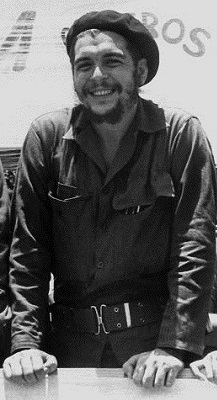|
~ Ernesto Che Guevara
~ Galéria
~ Oldal
~ Bejelentkezés
~ Vissza a Főoldalra
Ernesto Che Guevara, az argentin származású forradalmár, miniszter, gerillavezér és író, Buenos Aires-ben szerzett orvosi diplomát, majd a kubai forradalom során jelentős szerepet játszott a szigetország felszabadításában és újjáépítésében. A kubai gazdaság talpraállításáért dolgozott, küzdött az oktatás és az egészségügy fejlesztéséért, az írástudatlanság és a faji előítéletek felszámolásáért. Saját példájával népszerűsítette az önkéntes munkát. Kongóban és Bolíviában is harcolt - harminckilenc éves volt, amikor az amerikai-bolíviai csapatok csapdába ejtették és kivégezték.
| | |
|

| | |
|
|
|
1959 - 01 - 01
|
|
|
Yesterday, on 1st January the Cuban Revolution celebrated its 55th birthday.
With a one-day delay, I have brought you three articles (one in Spanish and two in English) that deal with this extemely important event and tell the story of the Cuban Revolution in a shorter and in a more detailed way.
Enjoy reading!
1959 Cuba: Batista forced out by Castro-led revolution
On this day in 1959, facing a popular revolution spearheaded by Fidel Castro's 26th of July Movement, Cuban dictator Fulgencio Batista flees the island nation. Amid celebration and chaos in the Cuban capitol of Havana, the U.S. debated how best to deal with the radical Castro and the ominous rumblings of anti-Americanism in Cuba.
The U.S. government had supported Batista, a former soldier and Cuban dictator from 1933 to 1944, who seized power for a second time in a 1952 coup. After Castro and a group of followers, including the South American revolutionary Che Guevara(1928-1967), landed in Cuba to unseat the dictator in December 1956, the U.S. continued to back Batista. Suspicious of what they believed to be Castro's leftist ideology and worried that his ultimate goals might include attacks on the U.S.'s significant investments and property in Cuba, American officials were nearly unanimous in opposing his revolutionary movement.
Cuban support for Castro's revolution, however, grew in the late 1950s, partially due to his charisma and nationalistic rhetoric, but also because of increasingly rampant corruption, greed, brutality and inefficiency within the Batista government. This reality forced the U.S. to slowly withdraw its support from Batista and begin a search in Cuba for an alternative to both the dictator and Castro; these efforts failed.
On January 1, 1959, Batista and a number of his supporters fled Cuba for the Dominican Republic. Tens of thousands of Cubans (and thousands of Cuban Americans in the U.S.) celebrated the end of the dictator's regime. Castro's supporters moved quickly to establish their power. Judge Manuel Urrutia was named as provisional president. Castro and his band of guerrilla fighters triumphantly entered Havana on January 7.
Source
Another interesting article in English: [This week in history]
An article in Spanish language: [55 aniversario de la Revolución Cubana ]
|
|
|


| | |
|
|
|
~ Ernesto Che Guevara
~ Gallery
~ Site
~ Log in
~ Back to the Main page
Ernesto Che Guevara, the Argentine-born revolutionary, minister, guerrilla leader and writer, received his medical degree in Buenos Aires, then played an essential part in the Cuban Revolution in liberating and rebuilding the country. He did his best to set up the Cuban economy, fought for the improvement of the education and the health system, the elimination of illiteracy and racial prejudice. He promoted voluntary work by his own example. He fought in the Congo and in Bolivia - he was thirty-nine years old, when he was trapped and executed by the joint American-Bolivian forces.
| | |
|
|

